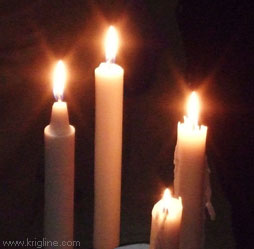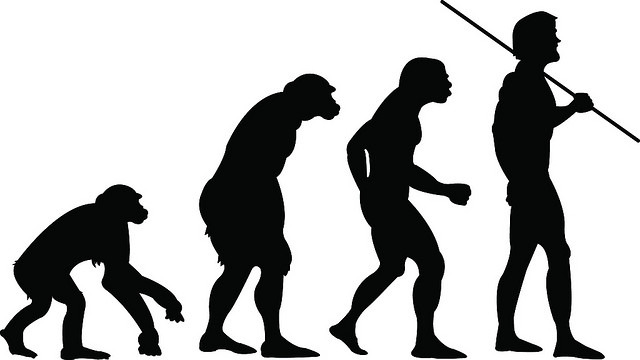(continued from previous column)
God’s Answers
Next we move to God’s
answers to the question “why?” You know, the Bible actually gives a
couple answers.
One is found in Habakkuk.
The prophet asked the question pretty much like we ask it: "Why
do You tolerate wrong? How long, O Lord, must I call for help, but You do
not listen?" (Hab 1:2,3). God’s answer is basically ‘don't worry
about it,’ or more accurately: "The Lord
is in His holy temple; let all the earth be silent before Him" (Hab
2:20). God tells the prophet, "Look and be
utterly amazed! I am going to do something in your days that you would not
believe, even if you were told!" (Hab 1:5). So, perhaps God doesn’t
tell us “why” because we wouldn’t believe or like the answer
(as was the case in Habakkuk’s time).
Another answer is given through the prophet Haggai. God
told him the people had planted, earned and expected much, but had little
to show for it. Why? Again, you probably won’t like the Bible’s answer.
God told Haggai it was because those who claimed to be God’s people
were so busy tending to their own lives that they were neglecting the real
purpose for their existence. This may or may not be the case in our
trials, but the lesson still applies: (as Jesus put it:) "Seek
first the kingdom of God and His righteousness, and all these things will
be added to you" (Matt 6:33 ESV).
The passage I quoted earlier from 2 Corinthians (1: 8-11) also
gives a partial answer to “the problem of suffering.” As Michael E.
pointed out last week, God sometimes allows suffering to strengthen our
relationship with God, and to humble us before Him. After Paul says
that they had experienced great affliction “in
Asia...so utterly burdened beyond our strength that we despaired of life
itself,” he goes on to say:
9b
But that was to make us rely
not on ourselves but on God
who raises the dead. 10 He delivered us from such a deadly
peril, and he will deliver us. On him we have set our
hope that
he will deliver us again. 11 You also must help us by
prayer, so
that many will give thanks on our behalf for the blessing granted us
through the prayers of many.
That is, Paul was saying that (at least in this case) God allowed the
suffering in order to make us rely on God (not on ourselves), also hinting
that it was supposed to build hope and to show the power of prayer.
To review the “four purposes of suffering” Michael E. taught
about last week:
God uses suffering:
1. to create/restore a love relationship with us.
2. to humble his children.
3. to display His grace.
4. to protect His children (and to accomplish His own aims).
Yet I think that my favorite Biblical passage on the problem
of suffering is where Jesus himself answers the question in Luke
13. He deals specifically with the false notion that "bad things
only happen to bad people." A couple of tragedies had recently
occurred. The first was a man-made tragedy: a wicked ruler had killed some
people from Galilee, Jesus’ home area, for no apparent reason. The second
was (perhaps) caused by an earthquake, or maybe poor workmanship, but
either way it was NOT the fault of the victims: a large building had
collapsed, killing 18 innocent people. Some of the witnesses were troubled
and approached Jesus with their questions. Jesus answered, "Do
you think that these Galileans were worse sinners than all the other
Galileans because they suffered this way? I tell you, NO! But unless you
repent, you too will all perish. Or those eighteen who died when the tower
in Siloam fell on them--do you think they were more guilty than all the
others living in Jerusalem? I tell you, NO! But unless you repent, you too
will all perish." To me, Jesus was saying, “You’re asking the
wrong question; repentance and eternal life are
important, not ‘why did these bad things happen’.”
So, we see that the Bible
addresses these questions, but it doesn’t exactly give us a
complete answer. Yet maybe this is the point. Maybe the answer is not
as important as the question itself, for in just asking it we are pointed
“up” to the Answer.
Fast forward 40 days to
Ascension Day. Perhaps as Jesus’ disciples were "looking up" at their
departing Lord they remembered His promise: "I will not leave you as
orphans . . ." (John 14:18). Jesus was referring to the Holy Spirit whom
He would send to those who believed in Him--the same Holy Spirit (or
Comforter) whose name means "the One who walks beside us." In our
times of grief that is what we really need: a Comforter-friend who will
walk beside us. Maybe heaven’s solution for our times of trial and tragedy
is not an answer, it is simply a relationship with the
Answer God promised to “send down” before the question was ever asked.
Singer Michael Card put it this way:
Could it be You make Your presence known
so often by Your absence?
Could it be that questions tell us more
than answers ever do?
Could it be that You would really rather
die
than live without us?
Could it be the only answer that means
anything
is You?!
The prescription of praise
Finally, having considered the question “why” and the Bible’s
answers (which I think of as more like a call to relationship than
answers), let us conclude by returning to Psalm 22 to find one of the
Bible’s prescriptions for our times of pain. That prescription, in
a word, is “praise.”
We started today with the agonized words of Jesus, who, dying
one of the cruelest forms of death ever devised by mankind, found the
strength to quote Scripture. It was a common practice in the time of Jesus
for a teacher to recite the first verse of a Psalm, and then his disciples
would recite the rest of the passage. If Jesus was doing this, imagine the
amazement of his disciples as they realized that much of Psalm 22 foretold
the details of the crucifixion (as we saw earlier). But if the disciples
continued to the end of the Psalm, they might have realized that Jesus was
calling them to think forward, past the “why?” question, past the
prophecies and horrors of His crucifixion. King David’s situation
obviously seemed just as hopeless when he penned those words. But in spite
of the pain and loneliness, in spite of the natural tendency to look up
and ask God “WHY”—David does not end his Psalm in a note of despair,
but with praise.
Now, in times of pain, praising God is not easy—it is not like
swallowing a candy-coated pill. It is more like the way my son used to
take liquid cold medicine. My wife put the little cup of red liquid on the
dining room table, and called our son to take his medicine. All of a
sudden he had a thousand things to do—he had to look for his slippers, he
washed his hands (slowly), he dried them (carefully), he poured himself a
cup of water, and when he could delay no longer he picked up the cup, put
it a foot in front of his turned up nose, and tried to convince his lips
to open (unsuccessfully). He counted to three (forward, then backward). He
did everything he could to postpone the inevitable moment when the “gosh
awful medicine” hit his tongue, coated his throat, and wound up in his
little body where—wonder of wonders—it started to make him feel better.
It is not always easy to praise the Lord, especially
when “Bad Things Happen.” But it is a prescription for deliverance;
not necessarily immediate deliverance from the trial, but deliverance from
the powers that bind and cast down your soul! If you can think of nothing
to say to God in that moment—no way to praise Him—just turn and recite
Psalm 22. That is why God has given it to you! Mark it now in your Bible (bookmark
it in your phone)—if you do not need it today, trust me there will
come a time when you will! Begin with its loud, lamenting initial cry:
“My God, why have you forsaken me?” But as you continue
reading, let the Holy Spirit remind you of the One who suffered on the
cross, when men pierced his hands and feet, waged their heads at him,
gambled for his clothes, and even His Father turned His Head and brought
Jesus to the dust of death [Ps 22:15]. But do not stop there at verse 15.
Follow David to the end, when—through praise—hope is reborn.
Join me now in reading together part of the end of Psalm 22
from the English Standard version (starting in verse 23):
23
You who fear the LORD, praise him!
All you offspring of Jacob, glorify
him,
and stand in awe of him, all you
offspring of Israel!
24
For he has not despised or abhorred the affliction of the afflicted,
and he has not hidden his face from
him,
but has heard, when he cried to him.
25
From you comes my praise in the great congregation;
my vows I will perform before those who
fear him...
27
All the ends of the earth shall remember and turn to the LORD,
and all the families of the nations
shall worship before you.
28
For kingship belongs to the LORD, and he rules over the nations.
--From Psalm 22
If Jesus was indeed drawing the disciples' attention to Psalm
22, He not only wanted them to see that the cross was a part of God's
eternal plan, but Jesus was also calling His disciples to think forward
through praise to the time when “All the ends
of the earth shall remember and turn to the LORD, and all the families of
the nations shall worship before you.” [22:27] You see, to Jesus
the cross was never “the end.” The cross was where life would “begin”—for
us and all who would one day bow down before a risen
Savior whose shed blood alone could
provide the power to forgive sin and restore a fallen race into a
relationship with God the Father—to the
utter amazement of heaven’s powers and principalities.
So Jesus’ dying question (“My God, My God, why have You
forsaken Me?”) stands to offer hope for all of us in our times of
despair. And it can just as accurately serve as a statement of faith—a
faith that was full of praise and which looked into the future to see
deliverance, pardon, restoration, and the unstoppable expansion of the
Kingdom of God.
According to the writer of Hebrews (from Heb 12:2-11--NKJV):
2…For
the joy that was set before him [Jesus] endured the cross, despising the
shame, and is seated at the right hand of the throne of God.
3 Consider him who
endured from sinners such hostility against himself, so that you may not
grow weary or fainthearted.... 11 For the moment, all
discipline seems painful rather than pleasant, but later it yields the
peaceful fruit of righteousness to those who have been trained by it.
Where is God when “bad things happen”? He is right here,
within us, suffering with us; He is only a praise away. Praise is part of
heaven’s prescription for any difficult situation here below, and God’s
answer to man’s deepest need is not the removal of evil but the offer of a
relationship with our Maker. As you and I look up and ask “why,”
God is looking down and drawing us to look ahead. He calls
us to pick up our cross and follow Him, not simply to death but to the
joy that waits on the other side of the cross. For as Resurrection Day
reminded us, the tomb is empty! The cross is where life begins.
I closed by singing the following song,
written after being touched by the centrality of the cross in the life of
a church in Cote d’Ivoire.
Where Life Begins (by Michael Krigline 1992)
Take me to the cross where life begins anew
Lead me to the battles, Lord, I’ll win through You
Fill me with the righteousness that conquers sin
Take me to the cross where life begins
Find me when I’ve fled away from Satan’s roar
Place me in Your hands and let me flee no more
Guard me, let me live to be Your slave and friend
Take me to the cross where life begins
Bridge
Help me to follow the steep, narrow way
Make me more like Jesus, Lord I pray
Filled with Your power, humble and kind
Living beyond the veil of death, Your joy to find
Show me how to love the way You first loved me
Use me to lift up the Lamb of Calvary
Send me to the harvest of souls trapped in sin
Take me to
the cross where life begins


